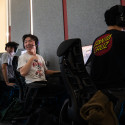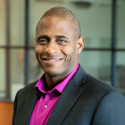Opening remarks at spring 2004 commencement
Opening remarks
Delivered by Chancellor John D. Wiley
May 15, 2004
Kohl Center
Welcome to everyone
On a recent late afternoon I was working late in my office on Bascom Hill and I happened to look out the window and saw a student kneeling on the sidewalk, using chalk to scribble a message. These are the hills that you’ve come to love and trudged up and down so many times in the last few years.
The messages there are always different, and the rain and your feet make sure that they change frequently. Many are political, religious, topical messages, simple announcements, and some are just whimsical. One day recently the entire text of “The Cat in the Hat” was chalked on the sidewalk.
Watching students engage in this traditional exercise is always a reminder that this simple act of speaking out, chalk in hand, is a vital part of the university’s civic mission. Just as important as teaching the rigors of science or the discipline of the professions or the depth of the humanities is building principles and instilling the courage to express them.
The University of Wisconsin is and always has been a place where a multitude of rich, stimulating and transforming conversations begin. From the political rallies on Library Mall and up those sidewalks to Bascom Hill’s famous bronze plaque that urges “a continual and fearless sifting and winnowing,” the UW experience is a seedbed for public discourse. It is a place where the debate takes shape, grows into research and inquiry, and reaches out into the community.
The tone and volume of the conversations vary, but, as the late Yale University president Kingman Brewster said, “Universities should be safe havens where ruthless examination of realities will not be distorted by the aim to please, nor inhibited by the risk of displeasure.”
The voices in our conversations echo in the laboratories from Engineering to the Medical School, and from the pages of the Badger Herald and Daily Cardinal to the Washington Post and the L.A. Times. They rise from picket lines and brainstorming sessions to solve problems here and abroad. Sometimes the voices rise as a symphony. Others times they’re just cantankerous noise. But regardless of the tone, free expression and energetic public discourse enliven this campus, sharpen your minds and invite participation from those inside and outside the campus.
Those free-wheeling exchanges lie at the very heart of the Wisconsin Idea — the notion that the boundaries of the campus are the boundaries of the state.
The power and breadth of these conversations is evident across campus, in the community and throughout the world.
During your time here and through a vigorous discussion, the UW has become a national leader in a movement aimed at ending the use of sweatshop labor for products bearing our name.
Discussions and concern raised about poverty in Wisconsin led the UW-based Center on Wisconsin Strategy to help develop the Milwaukee Jobs Initiative, which has proven to be one of the nation’s most efficient programs at economically advancing former welfare recipients.
Students spoke through public service and the community listened. Working as part of the Wisconsin Idea Fellowship, they found ways to increase organ donation, delivered nutritional information to homebound elderly, helped open educational gateways for teenage mothers, and brought prison inmates the gift of literacy.
The conversation spans the globe as the University of Wisconsin–Madison continues to be number one in the nation in the number of graduates we send to the Peace Corps to help give hope in Third World nations where hope is often in short supply.
The Law School’s Wisconsin Innocence Project last year was instrumental in the exoneration of Steven Avery, a man who served 18 years in prison after being wrongfully convicted. It took two years of work, but their persistent conversations and their efforts working through the court system finally won justice.
People from across the campus came together to debate and tackle issues ranging from fan behavior at Camp Randall Stadium to the Patriot Act to the ongoing issue of providing domestic partner benefits for our employees.
Students, through the New Voters Project, are opening a dialogue about the importance of voting. They are seeking creative ways to engage other students in conversations about democracy and our roles as citizens.
Debate and conversation are key to unlocking creativity that can boost the quality of life, challenge injustice, and even provide jobs and build economies. Richard Florida, author of “The Rise of the Creative Class,” challenges us to value creativity and to harness it as the engine for the 21st century economy.
Of course, conversation is about more than talking. It involves listening, about weighing ideas and building on the thoughts of others. That doesn’t come naturally. What seems to be more natural is the impulse to suppress the speech of those with whom we disagree. In fact, I’m frequently urged to do just that in letters that I get almost weekly. But that’s something we can’t do, we shouldn’t do and we won’t do. The best antidote to offensive speech is more speech.
Listening is an art. It requires tolerance and dedication. You’ve done a lot of that here. You may have been thrilled as new concepts and ideas were sketched out. From time to time, you may have been bored stiff. But as long as you were listening, even a little, a door to knowledge was opened.
It is vital to carry these creative conversations with you when you leave here and to trigger new ones. The power of democracy is in participation and in bringing the light of discussion to institutions unaccustomed to the vibrant level of discourse on this campus.
So keep chalking the sidewalks of your communities, wherever you go. Keep speaking honestly. And keep listening thoughtfully.
Congratulations to all of you and “On Wisconsin.”
Tags: commencement, learning



